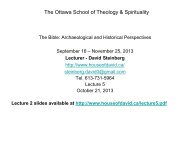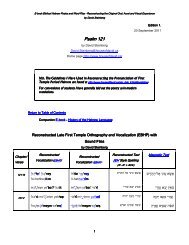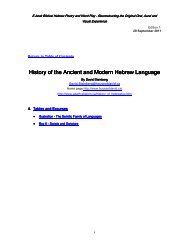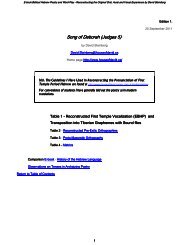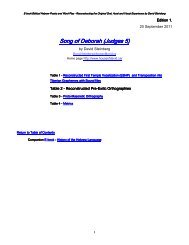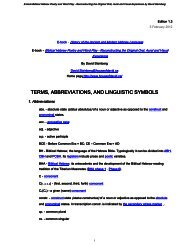Biblical Hebrew Poetry - House of David Steinberg
Biblical Hebrew Poetry - House of David Steinberg
Biblical Hebrew Poetry - House of David Steinberg
You also want an ePaper? Increase the reach of your titles
YUMPU automatically turns print PDFs into web optimized ePapers that Google loves.
30<br />
E-book<br />
<strong>Biblical</strong> <strong>Hebrew</strong> <strong>Poetry</strong> and Word Play - Reconstructing the Original Oral, Aural and Visual Experience by <strong>David</strong> <strong>Steinberg</strong><br />
- Elision <strong>of</strong> syllable or word-final aliph. This probably occurred early in this period.<br />
- [ś] ] > [s]<br />
- Reduction <strong>of</strong> final doubled consonants<br />
- Disappearance <strong>of</strong> intervocalic [h]<br />
- Spirantization<br />
<strong>of</strong> the bgdkpt Consonants<br />
- unstressed [aw] > [ô];<br />
[<br />
- unstressed [ay] > [ệ];<br />
[<br />
- Reduction <strong>of</strong> certain<br />
unstressed vowels to shewa or, in the environment <strong>of</strong> a laryngeal consonant, to another ultrashort<br />
vowel. Egs.<br />
prepositions<br />
[ba] > [bә]<br />
[la] > [lә]<br />
[ka] > [kә]<br />
(ii<br />
ii) ) Developments that clearly occurred in Phase 4<br />
- [ḫ] ] > [ḥ]; [ġ] > [ c ] before c. 200 CE<br />
- in contrast to the general Semitic tendency open pre-tonic syllables undergo lengthening and sometimes change <strong>of</strong><br />
vowel quality: a>ā, i>ệ. In the case <strong>of</strong> /u/, the short u remains, but the following consonant is doubled. e.g. */luqaḥ/ ><br />
/luqqaḥ/ (see - Pretonic Vowel Lengthening and doubling) c. 300 BCE<br />
(iii) ) Developments that may have occurred in Phase 4 or in Phase 5.<br />
- pausal lengthening <strong>of</strong> vowels<br />
- earlier vowel allophones become phonemes (ẹ ( ɛ o)<br />
- tendency toward stressing <strong>of</strong> the last syllable 70 . With very few exceptions open penultimate short stressed syllables<br />
were not preserved except, frequently, in pause. The vowel changes which accompanied this stress shift were<br />
different from those in the preceding stress period. Examples -<br />
• Nouns - */ˈpir<br />
piryu/ > */ˈpir<br />
piry/ or */ˈpi<br />
pirî/ (phase 3) → /ˈpri/ [ˈpr<br />
priː<br />
iː] or [pәˈriː<br />
iː] (context TH), /ˈpɛri/ [ˈpɛriː]<br />
(pausal TH)<br />
• Verbs PC - most root types and stems stress in the second person feminine singular, the second<br />
person feminine plural and the third person masculine plural moves to the final syllable in the contextual form<br />
but not in the pausal form due to the pausal lengthening <strong>of</strong> the stressed vowel. The same is true in the



